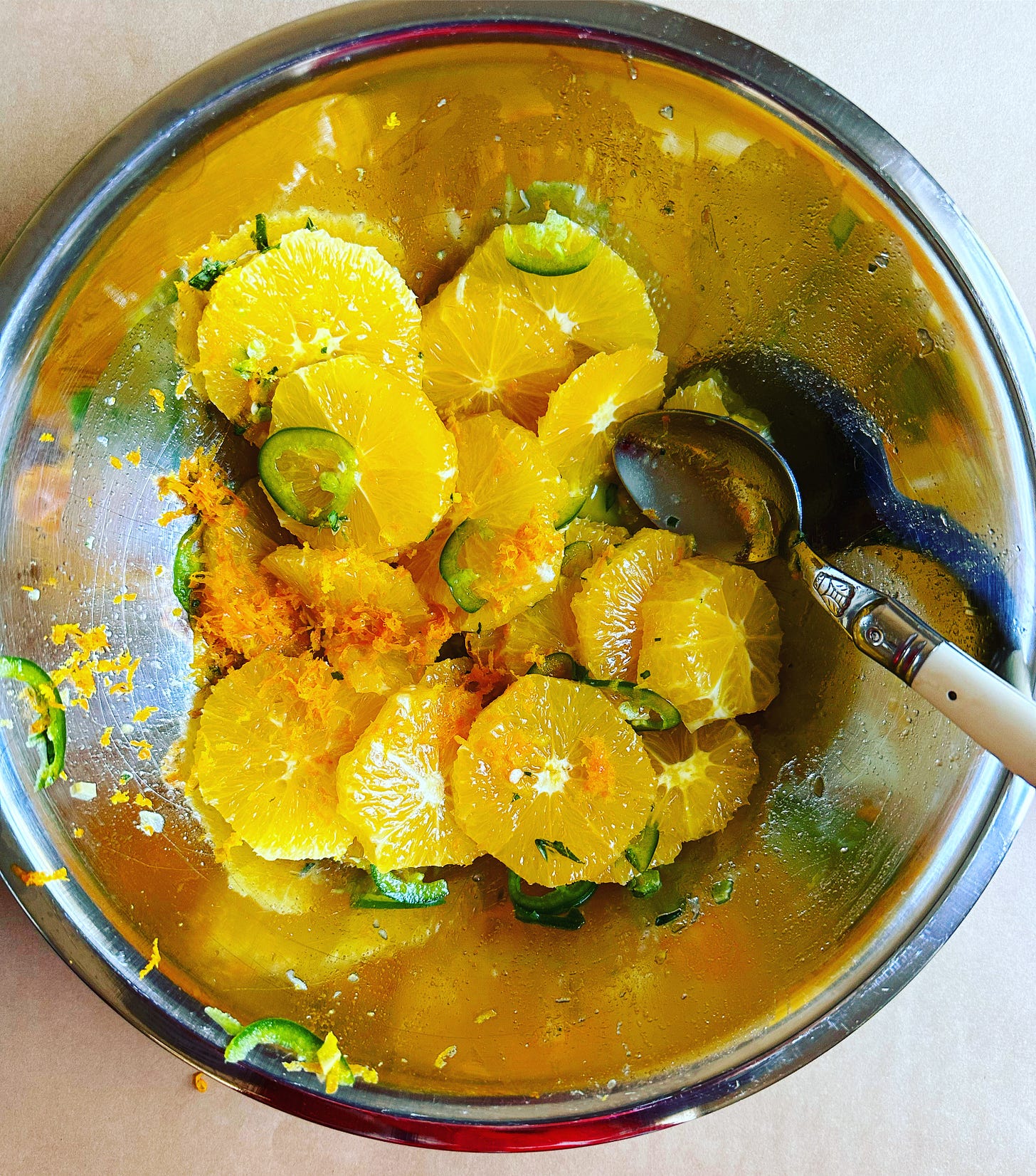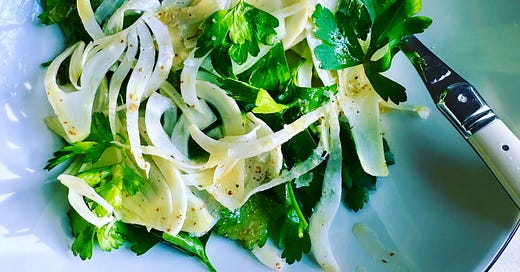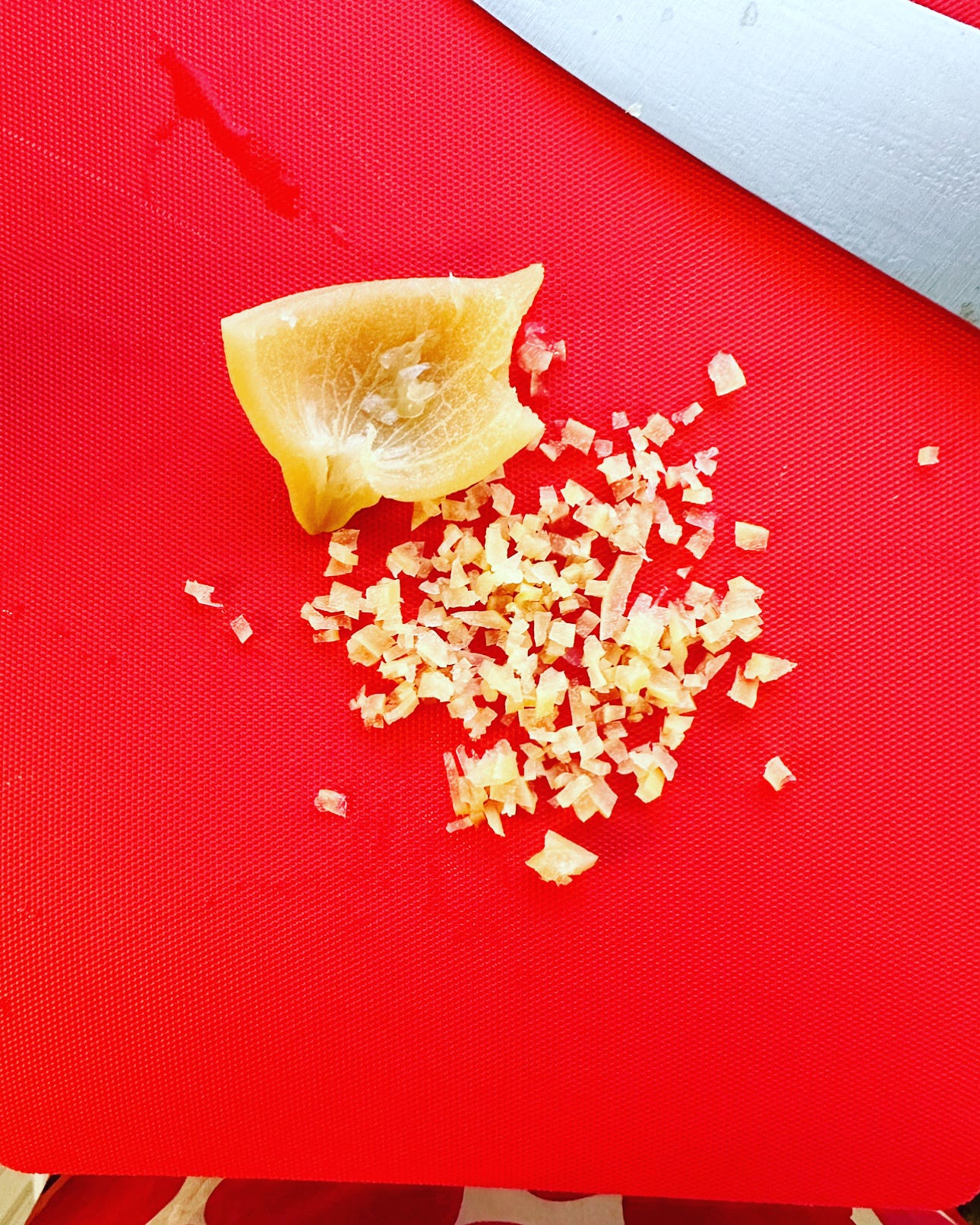Every Day Is a Holiday When Salad Is on the Table 🥗
But the question is: Is that a good thing or a bad thing? Either way, try these two refreshing salads, won't you?
I’M GOING TO GET ALL BRENE BROWN VULNERABLE and tell you that after we got an unusually high number of nice compliments on a recent issue—the one featuring last-minute Thanksgiving-complementary salads—I felt uncomfortable.
I realized it was probably not the reaction anyone involved intended—and that maybe the holidays had something to do with my hinky emotions? I was going to ask the boys in the lab how they felt about the response, but they were skiing in Austria and told me before they left not to bother texting them. Come to think of it, they tell me that wherever they go, even if it’s just across the kitchen counter from me. (This might be the year I offer both of them buyouts.)
So while working on your salads this week, I decided that I would hammer out for myself why it was that rather than reveling in such positive feedback—the way a normal, emotionally balanced human being trying to fully enjoy her extremely brief ride on this spinning planet would—I was vexed.
It seemed like a squandering of good vibes worth examining.

And since another very positively received recent DOS newsletter was about not just salad but also holiday feelings—and we are in the thick of the season still—I thought it might not be a bad idea to share my nonscientific findings here.
When I got the friendly feedback I’m talking about, the thought that went through my mind—not in a fully formed way but like a fly buzzing vaguely at my ear—was: Hey, what was wrong with all the other newsletters we’ve sent out over the last three years?
Basically, I’m the punchline to a very old joke.
Oh, no, I then thought. I’m one of those people who can’t take a compliment. We all know the type, of course, so we also all know I’m not alone in this affliction.
In fact, if you do an online search for the same words I did—“unable to take a compliment” and “why”— you’ll find that not only are there a zillion of us but that we appear to claim a zillion different explanations for being this way—reasons we believe are unique to us personally or that are characteristic of our sex, ethnicity, nationality, birth order, and eye color, among many other reasons and/or excuses.
I use the word “excuses” because I noticed that some of the articles examined how annoying people like me can be. Frankly, this seemed like victim blaming. Maybe I wouldn’t annoy you if you’d stop complimenting me.
Luckily, I’m also extremely defensive, so my next reaction was to quickly assure myself that while I may be bad at accepting compliments, I’m really great at accepting insults.
And then, since my brain is like a tennis spectator at a fast match, I said to myself: Emily, that is nothing to brag about. But even as I write this I don’t want anyone to think I’m actually bragging about being a good insult taker (or a good anything; I’m the worst!). Let me say right now that I’m sure there are many people who are much better at it than I am.
Besides, the fact that I might be pretty good at it (along with other maladaptive feats) was the result of a group effort.
Incidentally, insisting that an achievement is a group effort is a classic compliment deflector (according to my research), but in my case it really was.
The dubious group effort was scapegoating—I come from a long, long line of stonewallers and shunners and criticizers and gossipers, most of whom have not spoken to me or one another for a long time, including for decades-long intervals that in some cases ended only because people died.
As a result, I am off kilter when it comes to trusting nice things like compliments but also strangely resilient. Is that bragging? In this case I’ll own it; It took forever to get here and it almost killed me.
Another result: I’m stronger and happier than I’ve ever been and I’ve been working on notes for a book about family scapegoating. It will have recipes and jokes. (Not really! Well, maybe). So for those of you who don’t know, a scapegoat in Biblical terms is an actual goat that got loaded up with everyone’s sins, smacked on the tail, and sent out into the wilderness, carrying all their bothersome transgressions and any evidence of them far, far away. And everyone was able to sayeth: Sins? What sins? We have no sins.
In modern times a scapegoat is metaphorical, a strong person that a dysfunctional unit loads up with their undigested anger or sadness or guilt or feelings of low self-worth and disappointment. You can really pile anything on there. Rather than send the person into the actual wilderness (although I did end up alone in the wilderness for a long time after my tail was smacked), they shun them, hoping to make the heavy loads disappear with the person. Or at the very least, seem like someone else’s fault.
And as the scapegoat, you never get to know why. Because then you’d be able to defend yourself, thus defeating the entire point of this kind of scapegoating.
I wasn’t my family’s original scapegoat, but after he died, I was chosen as the pinch scapegoat. This happens in many dysfunctional families. (And in extended families, too. My scapegoating happened over a decade ago, but a couple of family friends from my hometown, whom I never see and am not close to, decided to get in on the action just recently. They scapegoated me from afar! Weirdos.)
And boy did I shine in the role. While out in the wilderness, I examined and reexamined the past, trying to figure out why I’d been excommunicated. I tried to justify my scapegoaters’ brokenness for them. And I eventually began to pride myself in my ability to parse the damage of humans who’d once been my favorite people, whom I loved more than anyone else in the world.
What I re-realized this week while working in my kitchen and pondering all of this is that I’ve always had it backwards. As common as it is for writers to examine things to death and as glorious as being a great scapegoat sounds, I wasted so much time that I could have devoted to brighter, happier things.
My moment of illumination: Rather than parse hurts and insults and unkindness—which, let’s face it, are dull, uninspiring things— why not parse the openhearted and kind things, like compliments!
And that’s how I came up with today’s salads; I used my deductive skills to reexamine the salads in that popular Thanksgiving-friendly salad bulletin that you liked and complimented. The elements they all had in common were lightness, few ingredients, easiness, and compatibility with many different dishes.
So I have more of that sort of thing today, in two more delicious salads.
And I hope that in lieu of the traditional gift guides you’re seeing everywhere, you’ll accept this non-traditional Department of Salad gift: a reminder to those of you with functional families to cherish them and pull together rather than apart.
And for those of you with dysfunctional families, a reminder that you’re not alone. Everyone just thinks everyone else is enjoying Norman Rockwell gatherings rather than wishing, like I often have, that they could be shot into space and enjoy the view from up there until it’s all over. Or they believe that their own flawed experience is the extreme rarity and that the bizarrely cheery, perfect holidays depicted in glossy magazines are the norm.
Magazines never show chilly, emotionally unbalanced holidays, or drunk holidays with screaming and crying and desserts tossed into sinks. How is that good journalism?

I guess I’m really writing this as a pep talk to those of us who need it right now, meaning anyone who has been through or is now going through family dysfunction. Because we appear to live in a world in which no one wants to admit that a family—while obviously so often a source of great love, comfort, strength, belonging, and connection—can be one of the absolute worst things that has ever happened to you. Even though you can never really stop loving them.
So I’m saying it right now.
But I’m also saying this: I know for a fact that we are all built to accept joy when it shows up (in any season). And that it always does.
And now on to the salads!
Keep reading with a 7-day free trial
Subscribe to The Department of Salad: Official Bulletin to keep reading this post and get 7 days of free access to the full post archives.











